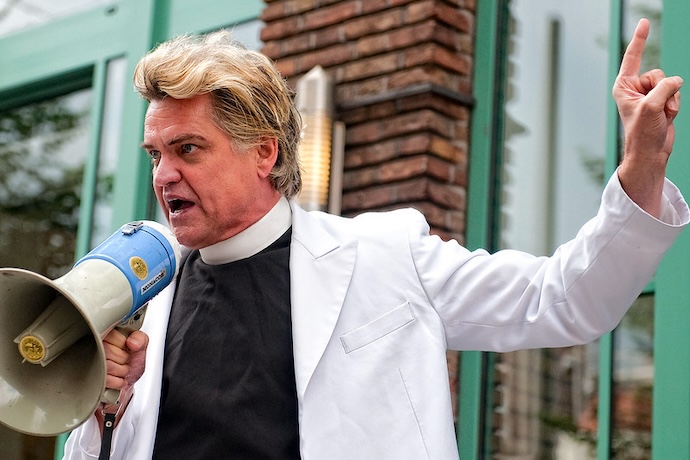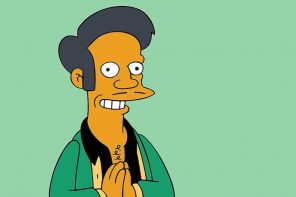Insofar as New York City’s streets are themselves a theater, Reverend Billy has been one of its stars, or star hecklers, for more than a decade. From his early preaching at the Disney Store at Times Square, to the “real” church that grew around him in the wake of 9/11, to the role he has played in giving shape to Occupy Wall Street, Billy Talen, together with his wife and partner Savitri D, have blended radical politics with prophetic preaching in a way that unsettles the usual categories of religious and secular, performance and regular life.
Then again, such confounding should be no surprise considering much of the latest scholarship in the study of religion. Few know this better than historian Kathryn Lofton, a religious studies professor at Yale and author of Oprah: The Gospel of an Icon, which examines how a television personality reveals to us our best selves, together with the rituals it takes to get us there. She is also a co-creator of Frequencies, a new online “collaborative genealogy of spirituality,” in which scholars, journalists, and artists prod subjects from Burning Man to This American Life.
There has never been a better time to explore the intersection between Reverend Billy and the kind of academic discussion Kathryn Lofton has helped to forge. This summer, Billy and Savitri published a new book, edited by Columbia University journalism professor Alisa Solomon—The Reverend Billy Project: From Rehearsal Hall to Super Mall with the Church of Life After Shopping. In it, they reflect on their theatrics, activism, where it all came from, and what it might mean. The book also gives us an opportunity to put the two of them in conversation with Lofton here.
Let’s start with some basics. Katie, what were your first impressions of the Reverend Billy character?
KL: Before looking at this book, I knew very little about Reverend Billy, except a vague sense of a hairstyle and seemingly jokey stunts. What I did know gave me a generally negative impression, because I thought—wrongly—that he was doing something like the Church of the Flying Spaghetti Monster, which for me was uninteresting since satirizing religious belief often seems to me to be a kind of hip religious bigotry. But this was wrong. Indeed, it seems they are preaching to the doubter in me. “It is easy for a latter-day Westerner to be suspicious of such talk to the point of laughing out loud at the very idea of a post-ironic effort to communicate with the earth,” Savitri writes. Consider me schooled!
Reverend Billy is definitely doing something that’s a unique combination of performance and preaching. How would you characterize it?
KL: At his best, Reverend Billy is the love child of Billy Graham and Allen Ginsberg. I think he, like many American activists, is invested in a sort of self-promoting iconoclasm in order to bring about greater equality. Like many American preachers, he invents a new consensus in his speech in order to develop the broadest base. And, like many in the avant-garde, he suggests his personal preferences are specific indictments of presumptive American norms. However, I think (like many love-children) he doesn’t and won’t equal the acclaim of his fathers because the message he repeats requires too much sacrifice. Consumerism is like individualism; it is so integral to the fabric of American self-understanding that de-conversions would require alterations in our cellular makeup.
If the scholar’s duty is to secure things in their proper rational categories, how would you place Reverend Billy? He certainly seems to confound, for instance, the boundary between religious and secular.
KL: For me there is no confounding, since to my etymological sense the religious and the secular have always been contingent categories. I could imagine teaching a class in which I include Billy in a genealogy that also includes Girolamo Savonarola. What is interesting from a historical perspective is the particular emphases of Billy’s preaching; it’s not the decadence of apostolic authorities or domestic art, but corporate power and Victoria’s Secret catalogs.
To the wedding industry, Billy says, “Corporate marketing’s repeated effort to mediate our life passage events is the Devil showing his hand,” and he praises the look shared by a couple in the marriage rite that is, to him, more real and more powerful than anything marketers can design. He writes, “Consumerism has taken all the language of freedom from history, and emptied those words of meaning by using them to sell products, from breath mints to war.” Billy wants to put meaning back into those words, back into ideas of freedom and community. His strategies for exposing their current bankruptcy are an amalgamation of signs from many institutional, theatrical, and cultural realms. But the most dominant are, absolutely, post-Reformation images of the preacher.
Does that sound about right to the Objects of Study? Do you recognize yourselves?
BT: The sensation of being well-seen, well-located—it makes me stare at the page. I do the shoutings of belief all the time, so I’m continually dredging and pouring out. I go for long periods of time not seeing myself from the distance that you describe me. Savitri is my main informant on the sighting from afar, because everyone else splits into love or hate.
SD: Reverend Billy is a mirroring device, something we hold up to the culture the way you might hold up a mirror to see if a witch will show up—in part you do that so that you really know she is a witch, but also so the witch knows you know she is a witch. I would put the secular/spiritual question in that framework, and I think “contingent” is an apt description of the relationship. That said, we are in the privileged position of never having to claim one or the other since we have no allegiance to the institutions that rely on these distinctions.
BT: Recently at Occupy Wall Street’s Liberty Square we had a song and sermon—the two overlapping—and the elements of costume, metaphor, history of religion, manipulation of cultural signs, and so forth were not the point. The choir sang “We are the 99%” repeatedly in strange, shifting harmonies and I prayed to the “mystery thing” that is in 99% of us, whirling around and around until we sang “Revolujah! Revolujah!” Suddenly the whole experience ended and everyone was quiet—but no one had made that decision. Let’s keep in perspective the ineffable. Amen? None of the considerations we’ve discussed so far would have mattered much that night.
Have you encountered limits to your approach?
SD: Sometimes the almost Fruedian anxiety provoked by the character interrupts the message—people who grew up in repressive religious environments tend to reject the figure outright. And who could blame them? On the other side, we feel the difficulty of a reflexive response amongst a certain kind of right-minded liberal who feels nervous that we will offend someone—not necessarily them, but someone. It’s just the least imaginative response. Of course we offend people. But sometimes the provocation gives the character enough traction to get a foot in the door.
Sometimes, also, the vocabulary of the preacher and choir feels narrow, too familiar. I think Reverend Billy has to either be dangerous or in danger, be threatened or be threatening, for the character to really work. It’s hard to keep that state of tension going all the time.
It’s striking that, last year, we had Glenn Beck reenacting Martin Luther King Jr.’s march on Washington and Jon Stewart and Stephen Colbert putting on a rally about mere “sanity.” Why was all this role-playing necessary? Should we wish that we could get back on some Straight Talk Express?
KL: Of course, Straight Talk itself is a pretense, which leads us to this maddening cycle of revelation that Oz is, indeed, just a man behind the curtain. What is most promising in Billy and Savitri’s work is how they actually cycle through the very facts of performance to find new authenticity. I think this is best exemplified in their discussion of Elvis Presley’s performance of “If I Can Dream” at his ’68 Comeback Special. Billy calls it a “three-minute miracle” and decides to deploy the song in one of their protests in part as a response to the commercialization of the song (and of singing, and of stardom) in American Idol. Yet they use this interpolation as an opportunity to think through the commercial signs that Billy himself uses in his physical evocation of Elvis. “I’m going to be radical, right now,” Billy cried out to his audience as the song concluded, trying to puncture the ways that pop culture laminates the real feelings and real struggle that often inform its production. That Billy finds a way to draw people back into the song, and his performance of it, is, I would argue, the same thing politicians need to do today: they need to tell the same stories we’ve heard before, in a way that acknowledges that we’ve heard it before while still making us believe it is, this time, true.
How much, in the process of planning these performances, do you think about political efficacy, as opposed to simply putting on a good show? How much do the two converge or diverge?
BT: We tried to go from the Elvis sermon to Union Square. Since the Highline Ballroom is on West 16th Street, we walked with the audience straight east four avenues to the old pavilion. It is rare that we create a stage show thinking that it will make an activist event work. We count ourselves lucky if we get to a bank lobby or a Starbucks cash register to make a public gesture together with a song and prayer to tie it up at the end. An activist campaign takes months or years, and the performance’s relation to it is to recount the progress of the campaign to a live audience. Possibly people would remember our deconstruction of the pixelated Elvis on the stage at the Highline and wish for such freedom of expression again in their public place.
SD: Well, a great performance gives an audience (member) courage, inspiration, the feeling that anything is possible. A performative success is when at the end of the show people stand in circles talking, or move into the public sphere together. In some value system that must be efficacy.
Maybe we don’t think about efficacy very much. We are dreamers. Story-makers. I’m not sure there is any efficacy in the current political environment. I am a proponent of a mystical radicalism that would completely undo late stage capitalism. That is a poetic stance, but at the moment our communities and the body itself are dominated by marketing, advertising, the stresses of capitalism, the imagination seems like all we have left.
That said, we have had some verifiable success in the political realm. Corporations have changed their policy and practice as a direct result of our actions. But that’s not the only goal, and I am troubled by the problem of efficacy, because I think we have a cultural chauvinism that oversimplifies how things actually happen in the political realm. We almost never know exactly why things change, or why at a certain point they can change and why at another point they really must change—we only recognize the inevitable after it has occurred. Just ask a random group what ended the Vietnam War and you will see what I mean.
KL: I can’t decide where Billy wants people to be after a Fabulous Worship—is it in a secular position? I think I’d be interested to hear more from Billy and Savitri about what they think happens to the cash register after its been exorcised, or what they think is the nature of a right marital rite without commercialism.
SD: It would be so much easier if there were just one cash register!
I’m struck by Savitri’s remark in The Reverend Billy Project that “the rhythms of preaching have nothing to do with Christianity.” Why, then, is preaching so immediately recognizable as a religious idiom? Katie, I’m curious if there are any historical considerations to bring to bear here.
KL: Yes. She also remarks that preaching is about delivery, but also that with preaching “you are actually rooted in meaning and you have something important to say.” I want to dig into that idea of meaning. If we saw Reverend Billy in Times Square next to a young man bellowing the St. Crispin’s Day speech from Henry V, how would we distinguish between the two? Billy himself says that he “fell in in love with preaching” because he “was in love with monologuing.” Here I think the history of preaching is actually integrally tied to the history of Christianity, insofar as it has been tied to the dissemination of a specific piece of good news.
So, we know Billy is a preacher because he tells us, time and again, that he knows something we might not fully understand, namely that we have been bought and sold, and that’s no good. A better life would come if we did something different—stop shopping. Shoppers are, in his language, sinners. The practices against such sin quickly proliferate. Reject the commercialization of our lives. Protect the life of the earth. The content of Billy’s messages is what gives him away as a preacher. He disavows Christianity left and right—saying, clearly, “I didn’t want to be a Jesus guy”—but I don’t think this removed him from the traditions that his verbiage and ritual action denote.
Could it be that the first preachers were really “just” performers?
KL: This question inevitably arises when we see people who are not professional actors do something in a theatrical way. People like preachers or politicians—if we see them behaving in a way that exceeds a tone of quiet seriousness, we say they are really just performing. This remark—it’s just performance—tells us that we think performance itself is something to be debunked, a sort of deception. We suspect the preacher (or politician) is doing something to please us, the audience, more than they are pleasing their role-specific obligations which are, ideally, not performances, but something real. Note that Obama gets slapped in the opposite direction for his lack of performance (or, rather, his dispassionate performance), which sometimes suggests to a certain public that he lacks a connection with our suffering real.
Without being too predictably professorial, however, I have to ask us how we want the idea of performance to function in our reading of matters religious. Now, it is certain that the Christians living in ancient Ephesus thought about theatricality, and thought about it in light of the new religion they were embracing. And we know that early Christian wariness about theater was in part an anxiety about proximity (don’t be taken by those phantasmorgia, they’re ungodly—be taken by ours!). But this is all to assume a kind of binary logic for the public self—that we’re either being really ourselves or we’re performing. My own interests lay in thinking about what comprises believability—what marks our ability to judge this difference. Many people seem interested in the fact that Billy stays in character always—it seems that he is more believable because of his consistency. Why would this be so?
SD: Rather than glorying in the unstable imaginative space between Reverend Billy and Billy, people cleave to the comfort of Billy being Reverend Billy. If we think that Reverend Billy would be Reverend Billy no matter what, that he would shout into an empty room, or wake up alone in the night in an anti-consumerist fever, if we believe that he isn’t “putting it on,” then, yes, we believe him to be more serious, more real. The more static he is, the more solidly in the firmament he appears. This illustrates something about the present moment, how materialistic we are, but also how passive—that we ask our figures to be who they are regardless of our interaction with them, as if who or what a person is isn’t dependent on the various feedback loops of human interaction.
Maybe the reason Billy is so often Reverend Billy is because people ask him to be Reverend Billy. They call him “Rev” even when he’s not in costume, so in fact he is very often rising to their demand, and this might actually be what makes a preacher a preacher—the congregation. This is why I say it isn’t a function of Christianity, but a function of community: believability is a result of their belief.
Let’s go back to historiography for a moment. Billy explains that part of his character comes from having read about historical criticism of the Bible. How does this take form in the performance?
KL: When I read Billy’s sermons, I don’t see an elaborate historical consciousness. This doesn’t mean that I don’t believe Billy himself possesses one. When I read about Billy’s emergence as a preacher, I thought the most significant force was his relation with the great Rev. Sidney Lanier, who helmed St. Clement’s Episcopal Church, an off-Broadway mission parish serving the Manhattan theater community. Billy says, “Sidney said that to listen to preaching I had to learn to turn off the text.” Next thing you know Lanier is having Billy listen to Lenny Bruce records—an amazing genesis for a street preacher!
BT: Rev. Lanier had me read Burton Mack, Elaine Pagels, and John Dominic Crossan, and I met Crossan at one of the Jesus Seminars. I would say that this was part of Sidney’s strategy to wean me from old fears of Christianity—my visible shell-shock from the Dutch Calvinists of my youth. Then he took me over to Lenny Bruce and to Sidney’s cousin Thomas Lanier (Tennessee) Williams. Sidney stressed again and again that Lenny and Tom were secular artists whose personal spiritual lives were highly developed, while their artistic strategies regarded Americans—even the secular ones—as a people who created the meaning of their lives from the morality tales of the Bible.
Sidney explained how The Fugitive Kind was a Jesus story, for instance. He told me to study High Plains Drifter and Pale Rider. The loneliness of the ’70s Eastwood classics reminded me of Burton Mack’s reflections on the problematic heroism of the lonely martyr on the cross. The chapter from Pagels’ Gnostic Gospels that talks about the sect that changed god’s name every day would be key to our church’s defense against fundamentalism. Crossan’s peasant priest/magic-man/polemicist and Pagels’ Magdalen opened up my view of intellectual and artistic affect. In particular, I was susceptible to old ideas of the hero of the arts. So when the choir came around me clapping on the Times Square sidewalk, and when Savitri joined as an equal at the pivot of 9/11, I was less fearful of my territory as hero and could relax into the partnerships of that community, which—my god!!—has made all the difference. It has been so interesting to watch Cornel West and Michael Moore and Susan Sarandon visit the Wall Street occupation. I am more comfortable there, in that world of no heroes.
To conclude: Billy refers at one point in the book to “the reality joke”—what’s the punchline?
KL: The fake is the only real we can begin to believe, now.
SD: I write in the book a bit about how Billy can be a fake leader for generations who have rejected leadership, or for those who can only perform the role of following. It almost seems like people, especially those that don’t self-identify as religious or political, need a way out of their convictions—a cover, a way to distance themselves from even their own ideology, as exemplified by the success of Jon Stewart and Stephen Colbert. It’s not really the news!!! This is what made the Obama campaign so moving and interesting. It seemed for a moment like the ascendance of the real. Or maybe it was all fake too.





